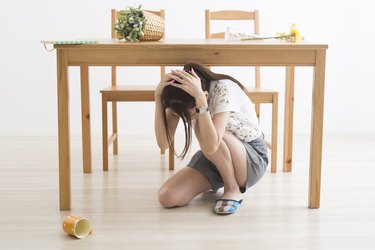
Do you know how to protect yourself during an earthquake? Even if you've been through one before, the sudden shaking of an earthquake can catch you off guard. Your immediate response to the earthquake can be a major factor in your safety.
Protect Yourself at Home
Video of the Day
Stay inside your house and take cover. Even earthquake-resistant housing can receive damage. It's best to stay where you are or move as little as possible unless you're in a dangerous location since the shaking can make you fall. Move away from windows to avoid broken glass. Look for other potential falling hazards, such as bookshelves, light fixtures and other heavy objects, and move away from them.
Video of the Day
A safer option than standing in a doorway is climbing under a sturdy table to shield your body from falling objects. Drop down on your hands and knees so you don't fall over due to the shaking. Hold on to the table during the earthquake. If there's not a table nearby, go near an interior wall or a low piece of furniture and use your hands to protect your head and neck.
Don't try to go outside. Debris falling off your house can hit you and cause injury. Walking during an earthquake can be difficult, and you might lose your balance and fall. If you live in a building with an elevator, don't use it during or after the earthquake.
Protect Yourself in Public Spaces
Public spaces can be more dangerous because of other people and the potential for falling items. Try to stay where you are located. Other people might try to make a quick exit, so if you head toward the doors, you could get shoved or hurt in the crowd. If you're in a store, try to avoid shelves or displays with lots of items that could fall on you. Avoid windows or large panels of glass that could break.
Protect Yourself Outdoors
If you're already outdoors when the shaking starts, the best way to protect yourself during an earthquake is to stay outside. Move away from buildings if possible since pieces from the exterior can fall off. An open area away from anything that could fall, including buildings, trees and utility poles, is the safest spot outdoors. Watch for sinkholes, power lines, fuel lines and other potential hazards.
Protect Yourself While Driving
Stop your vehicle and pull to the side of the road as soon as the earthquake starts. Choose a spot away from things that could fall on your car, such as overpasses, utility poles and power lines. Engage your emergency brake and stay inside your car.
After the earthquake, do a quick assessment before you move. If power lines land on your car, don't get out or try to drive. Wait until you get emergency help. If your car is fine after the earthquake, you can drive to your destination. Watch for dangers in the road, including cracking, debris in the roadway and collapsed bridges.
What To Do After an Earthquake
Brace yourself for aftershocks and do a quick assessment to see if you're in immediate danger. Some things that can happen to your home include broken windows, structural damage, water pipe breaks and natural gas pipe damage. If you have a natural gas leak, you need to get out of the building since there's a fire risk.
If you're safe in your home, check on the food and water supply. You might not be able to drink tap water after an earthquake if there's a water main break or contamination.
Getting Help If You're Trapped
If you become trapped, send a text if you have your phone handy. Banging on pipes or walls can help get someone's attention. If you have an emergency whistle handy, blow it to lead rescuers to your location. It's also a good idea to use your shirt to cover your mouth and nose while you wait for help.
What To Do for Injuries
Keeping an earthquake kit on hand with a first-aid kit can help you treat minor injuries until first responders arrive. For serious injuries or medical emergencies, call 911 immediately. It might take emergency responders longer than normal to get to you due to an increase in calls and debris on the roads. If you have a minor injury, contact your health care provider or drive to an urgent care clinic when it's safe to do so. Drive slowly and watch for hazards in the road.